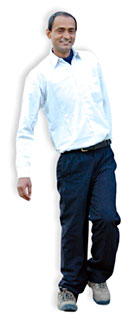 Sudarshan Subedi was eight when he developed a limp. His village in Parbat was a 10 day walk from the hospital in Kathmandu so he got no treatment. Today, at 33, polio has become a part of Sudarshan's life.
Sudarshan Subedi was eight when he developed a limp. His village in Parbat was a 10 day walk from the hospital in Kathmandu so he got no treatment. Today, at 33, polio has become a part of Sudarshan's life.
Sudarshan\'s father was determined that his son should recieve an education and rallied his fellow villagers into opening a local school. Even as a boy Sudarshan remembers being determined to overcome his physical disability, he used to play goalie in football matches and applied himself to his studies. After graduation, Sudarshan's heart went out whenever he witnessed others like him being mistreated and he was determined to redress this injustice.
Working on his thesis for a law degree, Sudarshan came across a clause in the law that provided free education to those with physical handicaps. He applied for this but got only half a fee waiver. Sudarshan challenged this in court and won the case that set a precedent for others.
Sudarshan then set up the Disabled Human Rights Centre (DHRC) in 2000 through which he hoped to change the system. "There were over 500 organisations working for differently-abled people but they looked at us as charity cases and we wanted to change that view," he says.
DHRC has been working in advocacy and spreading awareness about the rights of the disabled through a newsletter called Apanga Awaj and radio programs. For his perseverance and commitment for the rights of the disabled, Sudarshan was awarded the Asoka Fellowship last year.
For many, this would be the time to bask in the glory and take a back seat. But Sudarshan says his struggle is just beginning: "People say they are aware about the needs and rights of the disabled but it doesn't show in their behaviour. We don't need charity, we need our rights as citizens and inclusion in society."
Aarti Basnyat


